Several Ohio politicos — including the state’s House Speaker Larry Householder (R) — were arrested and slammed with federal charges Tuesday over a massive alleged bribery scheme.
In an affidavit released Tuesday, an FBI agent spelled out how the men, working with and through the dark money group Generation Now, allegedly pushed legislation last year to bail out two aging and financially troubled nuclear power plants in exchange for millions of dollars of bribes and political support.
The alleged criminal enterprise is “likely the largest bribery–money laundering scheme ever perpetrated against the people of Ohio,” U.S. Attorney for the Southern District of Ohio David DeVillers said at a press conference Tuesday.
The scheme was allegedly fueled by $60 million from a company identified as “Company A” in the affidavit. From the affidavit’s description, that company appears to be FirstEnergy, the owner of the power plants at the time the legislation passed last year. The bailout legislation ultimately showered more than a billion dollars in cash on the power plants.
“Everyone in this room knows who Company A is,” Devillers said Tuesday.
According to the affidavit, the scheme started in early 2017, when Householder took a trip on Company A’s private jet. Shortly thereafter, he allegedly began receiving quarterly $250,000 payments into a 501(c)4 that he himself secretly controlled: Generation Now.

Over the years, Company A allegedly spent more than $60 million on the so-called “Householder Enterprise,” funding pass-through groups and politicians in pursuit of the bailout it ultimately got last year.
Through Generation Now, Company A allegedly spent cartloads of money supporting candidates for the Ohio statehouse who would support Householders’ bid for speaker. Householder and most of those candidates subsequently supported House Bill 6 — the Company-A-supported legislation to prop up the power plants — and defended it against a referendum aimed at reversing it after the bill passed.
“We’re not done with this investigation,” DeVillers said Tuesday. “There’s going to be a lot of busy FBI agents and AUSAs here in the Southern District of Ohio.”
‘The Speaker’s (c)(4)’
The affidavit quoted several of the other men arrested Tuesday — former state GOP chairman Matt Borges, lobbyists Neil Clark and Juan Cespedes, and an adviser to Householder, Jeff Longstreth — speaking about Company A like a piggy bank. The millions of dollars that Company A “donated” to Generation Now, the affidavit said, “are akin to bags of cash.”

In recorded phone calls, the defendants allegedly discussed the advantages of bankrolling their operation with a 501(c)4. “You don’t have to be afraid of anyone,” Clark allegedly told Householder in one recorded call, discussing the advantages of a group that didn’t have to disclose its donors to election authorities.
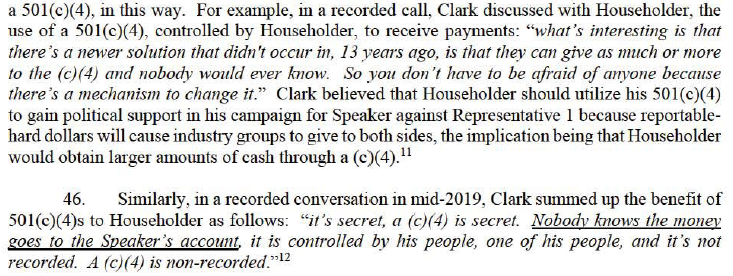
And, lest there was any doubt that Company A was heavily invested in Householder’s scheme, Borges — a lobbyist for the company and alleged “key middleman” in the scheme — spelled it out in yet another recorded call, according to the feds. 
Though the scheme allegedly culminated in the 2019 passage of HB6, which bailed out FirstEnergy’s power plants, it went back years — starting with an effort to get Householder the speakership.
After being term-limited in the early aughts and leaving the legislature, Householder was reelected as a state representative in 2016. But before he was even elected that year, he allegedly already had his eyes set on another run as speaker.
A document created in October 2016 and found in the possession of his top adviser, Jeff Longstreth, allegedly showed the plan for 2018: Use a 501(c)4 as the “recruitment and fundraising arm” in order to fill the House of Representatives with Householder loyalists.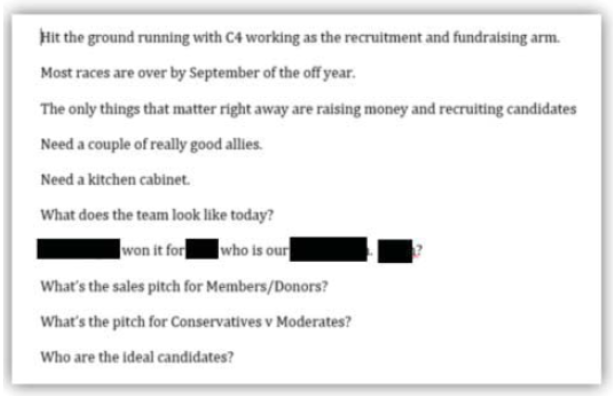
According to the affidavit, the Householder Enterprise backed 15 candidates (including Householder) in the 2018 primaries and added six more candidates in the general election. Most of these candidates won their races, the affidavit said. All who won voted for Householder to become the speaker, and all but two voted for the FirstEnergy bailout.
Informed that some people had opted to help another representative’s bid for the speakership, Householder allegedly replied in a recorded conversation: “Yeah, we can fuck them over later.”
The ‘Company A’ Piggy Bank
Over and over, bank records show Company A allegedly wiring hundreds of thousands of dollars into Generation Now, as well as pass-through companies, at crucial moments — such as days before the November 2018 elections.

“The volume and timing of the payments from Company A proved crucial to the Enterprise’s success,” the affidavit asserted.
According to the feds, the scheme heated up once the bailout package was up for a vote, in mid-2019. As Householder herded the legislation through the House — helped by a hefty ad campaign allegedly funded by Company A — he allegedly applied pressure to lawmakers to get on board.
In the middle of an interview with an FBI agent, in fact, one unnamed representative allegedly received a text message from Householder asking for their support.
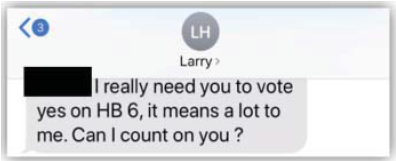
When the legislator refused, Householder allegedly responded: “I just want you to remember — when I needed you — you weren’t there.” The affidavit said that Householder, through an unnamed intermediary, later instructed the legislator to delete the texts he’d received from Householder about the legislation. The legislator informed the FBI.
As the legislation moved to the state Senate, texts obtained by authorities show Householder’s deep involvement in Generation Now: In one series of texts with Longstreth, his top adviser, Householder allegedly complained about seeing the same Generation Now ad over and over again — or, in Householder’s words, “that poor sum bitch drive that pickup truck down the road and cry about losing his job.” The ad, Householder allegedly said, was “burnt in.”
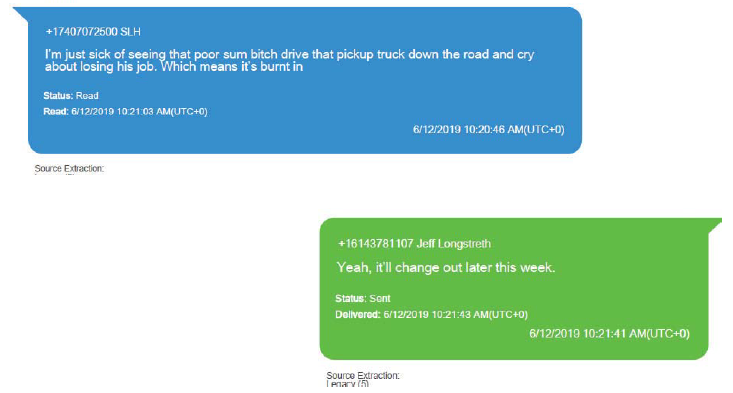
‘Let’s just get all the signature firms hired tomorrow’
The fight against HB6 continued even after Gov. Mike DeWine (R) signed it into law in July 2019. At that point, a group of Ohioans launched a signature drive to get a referendum on the next ballot to reverse the law. Even then, the feds said, Householder’s scheme tried to stay one step ahead.
Responding to the signature-gathering effort, Cespedes, the lobbyist and alleged middleman, talked strategy with Longstreth. The plan? Hire all the competent signature-collection companies, so that anti-bailout activists couldn’t.
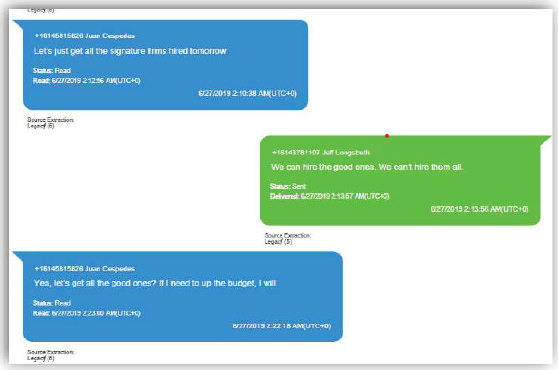
In addition to supporting Company A, Householder and his crew also opposed the referendum effort because its success would undermine Householder’s power, the affidavit alleged.
At a dinner with Householder in September last year, Clark allegedly said that legislators needed to know: “If you attack a member, we’re going to fucking rip your dick off.”

However, as the anti-bailout effort gained steam, the Householder Enterprise appeared to grow desperate. And so, per the affidavit, Householder’s crew allegedly offered bribes to the opposing side’s signature-gathering operation to switch sides.
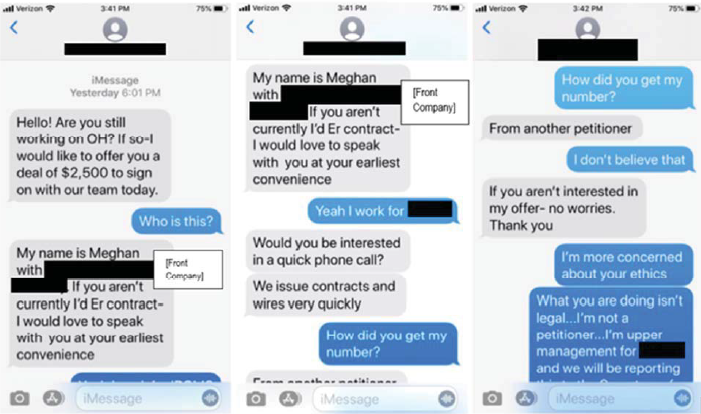
The Householder Enterprise also allegedly offered $15,000 to a manager for the other side’s operation, in exchange for information.
That was a mistake. The affidavit didn’t name the manager who accepted a $15,000 bribe from Borges — because they were working with the FBI. Instead, the affidavit refers to them as CHS 1 — the confidential human source who helped document what may be the largest bribery scandal in Ohio history.


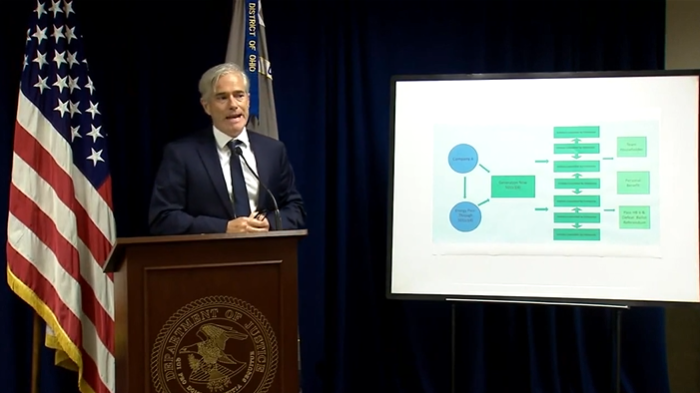




Grifters, one and all.
Yes. Need a top-to/bottom housecleaning of the GOP. Flush all the rats out of their holes.
Free Markets, Republican style.
Dewine signed the bill. It’s a corporate bailout. I wonder if he is implicated?
You would think an ethical governor would not sign such a thing. I am not from Ohio, so I don’t know the details.
Lesson for grifters; better to fuck them over now, because later may never come for you.
Hey, ho, way to go, Ohio!